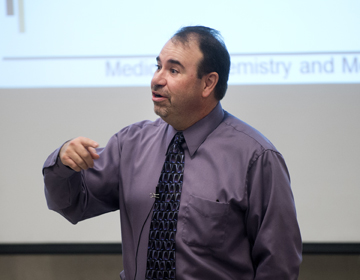Murphy Award winner: Eric Barker
April 10, 2013
 |
|
Eric
Barker, professor of medicinal
chemistry and molecular pharmacology, is a recipient of the 2013 Outstanding
Undergraduate Teaching Awards in Memory of Charles B. Murphy. (Purdue
University photo/Mark Simons) |
Six exceptional teachers have been selected as recipients of the 2013 Outstanding Undergraduate Teaching Awards in Memory of Charles B. Murphy. This week, Purdue Today will feature a profile on each of the recipients. Today, we focus on Eric Barker, professor of medicinal chemistry and molecular pharmacology in the College of Pharmacy.
When Eric Barker lectures, he does so with the same enthusiasm and gusto he had the first time he presented the topic -- even if he's actually taught it a dozen times or more.
Making sure he lectures enthusiastically is just one way Barker keeps his teaching accessible and interesting. To ensure that his students truly understand the subject -- and to ensure that they become knowledgeable professionals once they graduate -- Barker employs several techniques, including storytelling, technology and mentorship.
Beside his passion for his field, Barker also is known for making difficult and complex topics sound relatively easy and simple. Doing so can be challenge, Barker says, because he teaches about such complicated things, such as drugs that affect the brain and the nervous system as well as a variety of drugs used to treat high blood pressure.
"The anatomy and physiology of the kidney, for example, can be quite complex," says Barker, who is also the College of Pharmacy's associate dean for research.
"When I teach my students about it, I try to separate the kidney's anatomy into several individual parts, and then I go over each part slowly. When we're done, we use knowledge of the kidney's anatomy to piece it back together. I use my whole body as a model to help illustrate this anatomy, so I can point out each part of the whole."
Using stories to help illustrate complicated concepts is another of Barker's signature techniques. For example, when describing the body's autonomic nervous system -- and specifically the "fight or flight" instinct -- Barker describes different several scary situations. He then details how the body reacts to each.
Barker has been using online streaming for 14 years to post recordings of his lectures.
Specifically, he creates five-minute videos to address common questions students have about several of his subject's more complicated, confusing topics. The videos' effectiveness shows, Barker says, in that undergraduates rarely ask the same questions they did before he made the videos.
Making sure students thoroughly understand his complicated course material is important because they may have to apply it one day to help make patients healthier, Barker says.
"To know how to apply the information, first students must truly understand the concepts and material," Barker says. "Making sure they are able to understand and apply their new knowledge is one of my biggest goals as a teacher."
Writer: Amanda Hamon, 49-61325, ahamon@purdue.edu
